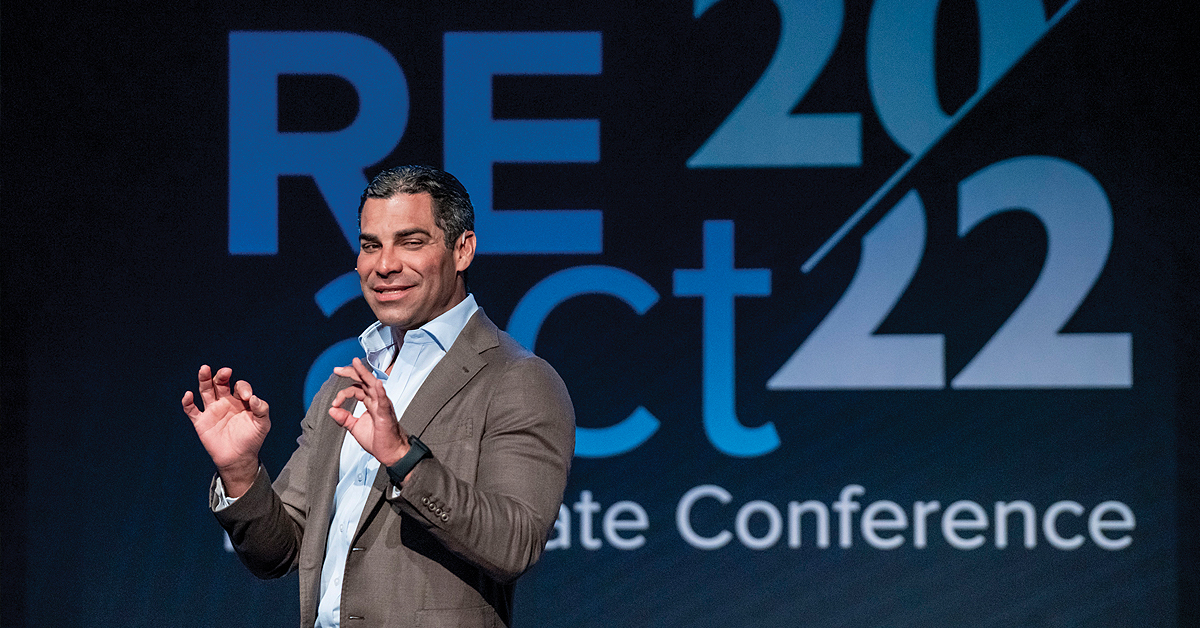
Miami Mayor Francis Suarez discussed the fast-paced evolution of Miami’s real estate market at REact 2022, FIU Business’s annual real estate conference.
By Cynthia Corzo
Evolution has been key in Miami’s economic history – from tourism to financial center for Latin America to high-profile hub for financial and tech companies. Today, it’s the evolution of the real estate profile that has a starring role.
The Hollo School of Real Estate at FIU Business brought together 200-plus attendees in November 2022 at REact 2022 – Miami: A Real Estate and Technology Powerhouse, its second annual real estate conference.”
Keynote speaker Miami Mayor Francis Suarez (BBA ’01) recalled the area’s progress from the days of NINJA loans and doubledigit losses in real estate values in 2008 and 2009. Although he was nowhere near being elected back then, Suarez sees it as a valuable lesson. “We have to compete,” said Suarez. “We just can’t sit back and hope we survive the competition.”
He pointed out that over the last 24 months, $2.5 trillion in assets have relocated to or made a significant footprint in Miami, including Blackstone, Citadel, FTX and Millennium. In real estate, prices are up 12% on purchases as well as 30% on rentals.
“There isn’t a city that has a brighter future, that’s better positioned for the next 10 years, than Miami,” Suarez said. “Our focus is to keep taxes low, keep people safe and drive innovation. We’re No. 1 in the U.S. in tech job growth.”
An in-depth look at the local real estate and business landscape – “Miami: Still a Boom or Bust City?” – kicked off the conference. Industry experts discussed some of the factors that have driven South Florida’s real estate demand and economic base.
“The bust in other cities, countries and economies proved a boom in our city,” said Veronica Cervera Goeseke, CEO of Cervera Real Estate. “Miami comes out of difficult times faster than [other places].”
Financial crises in Miami, like in other cities, create opportunities to develop larger projects, to get more creative, explained Jeffrey Ardizon, principal at The Estate Cos, which has 13 apartment building deals in its pipeline.
Panelists agreed that the city’s cultural diversity, global investments, smart development, talented workforce, supportive government and innovations in public transportation are key to the continued, long-term growth and stability.
“When you’re looking at Miami, there’s a lot of permanence and ability to perform,” said Aly-khan Merali, CFO of Turnberry. “The horizon is quite limitless.”
Land prices, commercial properties and supply chain issues continue to command attention in the real estate industry, including corporate and retail. Several conference presenters forecast corrections in land and construction prices. Others said caution is a must, but don’t see significant distress in the marketplace.
In one session, panelists discussed the lack of rental properties and whether enough are being built. “Will the current development satisfy the need, or are we going to overbuild?” moderator Adam Tiktin, managing director at Franklin Street, asked panelists.

Cassie Resnick, managing director at Mast Capital, discussed the lack of rental properties in the region and whether enough are being built.
“It can’t keep growing in the same place and call it growth,” said Cassie Resnick, managing director at Mast Capital.
Jakub Hejl, president of Westside Capital, added that new housing growth will come in areas away from the city center, but near mass transit options.
Terra Group’s Upland Park mixed-use project is located at the Dolphin Station park-and-ride facility in western Miami-Dade County. Now under construction, the 43-acre site is approved for 1,700 apartments, 200,000 square feet of retail, a hotel, an office building and a school.
The developer’s CentroCity project in Miami, anchored by redeveloping the Central Shopping Plaza across from Magic City Casino, will address neighborhood issues, including older retail spots with inadequate parking. It will include 1,200 apartments, commercial office building space, 320,000 square feet of retail and 3,145 parking spaces.
“There are a lot of great dynamics, and our retailers want to be in Florida,” said Rod Castan, principal at Metro Commercial. “Retail’s not dead, it’s just changing.”
The panelists concurred that Miami will continue to grow.
“Not everything is contracting,” Resnick said. “There are a lot of areas of growth and a lot of money to make on new deals.”
FIU professors Eli Beracha, director at the Hollo School; Zhonghua Wu, professor at the Hollo School; and Clay Dickinson, adjunct lecturer at the Hollo School, presented research on real estate, hospitality and also technology and discussed how academia is partnering with industry practitioners to prepare the next generation of investors.
In the day’s final panel, experts discussed the leading role that bitcoin, blockchain, cryptocurrency, non-fungible tokens (NFTs) and tokenization will take in real estate transactions. Panelists agreed that from a nearly nonexistent role 20 years ago, technology’s activity in real estate is mind-blowing.
“For investors, technology offers less barriers to entry,” said Juan Alvarez (MSIRE ’14), president of Blokhaus Real Estate Tokenization. “Cryptocurrency can be used for transactions; security tokens for smart contracts.”
Investors are also looking closely at real estate tokenization, which breaks assets into smaller units of ownership and allows small- to mid-sized investors to purchase part of a property.
One of the trending topics right now is NFTs – digital assets including collectibles, artwork and video game characters. Their feasibility for real estate transactions is being explored.
“Right now, it’s a bit of a novelty,” said Sami Ahmed, counsel at PAG LAW. “In the future, an NFT transaction can happen in a few seconds.”
Today, technology is also making vacations and events easier to plan, execute and purchase, noted Greg Pesik, senior management advisor at Provision Partners.
“It allows you to create identical twins, an experience for guests who want to go to those places. You can see the room in a virtual world and how it can be set up for an event,” he said. “The use of cryptocurrency on booking engines for travel has grown 200%.”